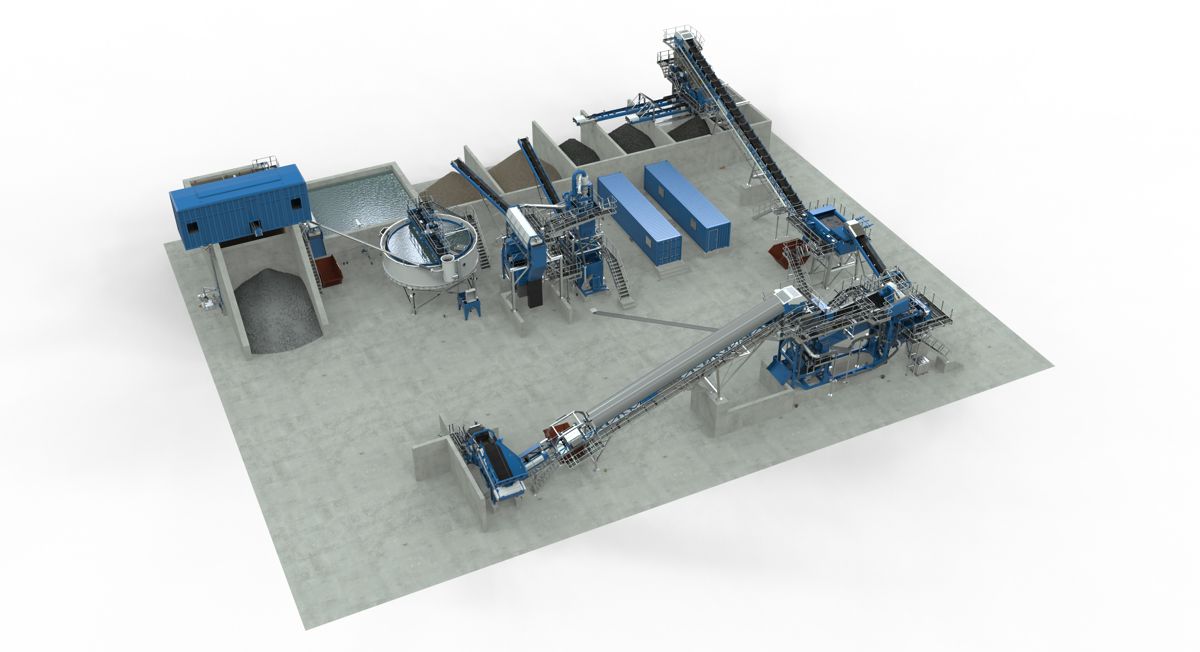Ace Liftaway in Hampshire tackles trommel fines with investment in CDE solution
Waste management firm Ace Liftaway has announced plans to introduce a new trommel fines recycling plant to its waste recycling and processing facility in Hampshire.
The new 90tph wet processing solution with integrated eddy current separator (ECS) for separating non-ferrous metals from the waste stream is designed and engineered by industry experts CDE.
When commissioned, it will equip the firm with the technology to advance the circular economy in Hampshire and its neighbouring counties.
The plant will be located at the company’s Yokesford Hill site, home to a state-of-the-art waste recycling and grading plant, installed in 2008, where Ace Liftaway recycles up to 90% of all incoming dry waste streams from its business activities, producing recycled aggregates for the construction industry.
One of the industry’s most difficult materials to process, trommel fines constitute a large proportion of the remaining 10% of waste processed by Ace Liftaway and are typically sent to landfill incurring high charges for the business.
Its managing director, Philip Liddell, says its investment in the CDE solution will help close the loop: “The core of our business is skip hire services and we’re proud of the very high recycling rates we’ve achieved to date through the dry processing techniques we use at Yokesford. However, the residual stream from this process, our trommel fines, requires a more robust approach and that’s why we’ve partnered with CDE.
“Trommel fines have a lot of value in them and we want to try to extract that value.”
“With this new solution we can unlock their potential to extract resources with commercial resale value while saving on landfill disposal costs. It’s worthwhile economically and environmentally.”
Turning waste into resource
Generally, trommel fines are produced as part of the recycling process and consist of materials such as wood, aggregate, sand, glass, and organics.
CDE’s business development director for the UK and Ireland, David Kinloch, says trommel fines contain more resource than they do waste: “Trommel fines are a source of significant cost for contractors, but also one of opportunity. Whether they are subject to the standard or lower-rate landfill tax they represent a business expense, that is unless they are processed effectively. With CDE technology, a business can transform that cost into a fresh revenue stream through the recovery of clean sand and aggregates extracted from their trommel fines waste.”
The fibrous nature of trommel fines often makes them difficult to separate and recycle so they have traditionally been sent to landfill, delaying, rather than addressing, the problem. As they are traditionally high in lightweight, organic content, trommel fines fail to meet the specified Loss on Ignition (LOI) threshold of 10%, therefore incurring the standard, and higher, landfill tax rate.
Ace Liftaway considers washing the way forward to fully utilise trommel fines, Phillip explains: “The future really lies in maximising recovery from these waste streams. Wash plants like that designed and engineered for us by CDE are the future of our industry.
“We looked at other manufacturers, but CDE had the edge. They are leaders in this space who recognised an industry-wide problem and engineered a workable solution to address it.”
The Landfill Tax
In April 2021, the standard and lower rates of landfill tax increased in line with the Retail Prices Index (RPI), rising to £96.70 and £3.10 per tonne from £94.15 and £3.00 respectively.
A decade ago, in 2011, the standard rate UK landfill tax was £56, representing an increase of over 70% compared to the 2021/22 rate.
When the landfill tax was introduced in October 1996, as a measure to encourage waste producers and the waste management industry to switch to more sustainable alternatives for disposing of material, the standard rate was just £7.
The business case, therefore, to recover materials from trommel fines is an attractive proposition to waste processors as trommel fines attract the higher rate of landfill tax, with a Loss of Ignition (LOI) of more than 10%.
Through the washing process, CDE is able to remove the lightweight and organic material directly linked to LOI and transform the largest proportion of the trommel fines waste stream into sellable products for the construction market. Its trommel fines solutions segregate and concentrate lightweight and organic materials into isolated fractions so they are easier and more cost effective to dispose of, whilst converting the heavy fractions into sellable sand and aggregate products.
Ace Liftaway’s CDE plant includes a CFCU which uses density separation to remove the fibrous, organic and polystyrene materials which contribute to the high LOI content of trommel fines. Once these materials are removed a high quality finished sand product remains, creating a fresh revenue stream while saving an estimated £96.70 per tonne on landfill costs.
One waste stream, five products
When commissioned, Ace Liftaway will produce a range of products for the secondary aggregates market, including: 0-2mm, 0-5mm, 5-10mm, 10-20mm and +20mm sized aggregates.
A new testing regime will also be implemented to demonstrate the potential of the recovered trommel fines, Phillip explains. “My aim is that the by-product of the silt will become a recognised soil conditioner which will stem from a robust testing regime.”
In addition, the integrated ECS will facilitate the recovery of non-ferrous metals and help accelerate return on investment.
“We realised trommel fines carry a lot of ferrous and non-ferrous product. Even with pre-sort systems in place a small percentage still makes it through,” Phillip says. “By incorporating a metals recovery station we’re confident we can maximise material recovery from the trommel fines waste stream and achieve fast return on our investment; our estimate is within just two years.”
Ace Liftaway is a family-owned and managed business established in 1988 by husband and wife team Philip and Melanie Liddell. Over the past three decades, the business has grown from one truck and eight mini skips to over 1,500 skips of various sizes available for hire throughout Hampshire, Wiltshire and Dorset.





























